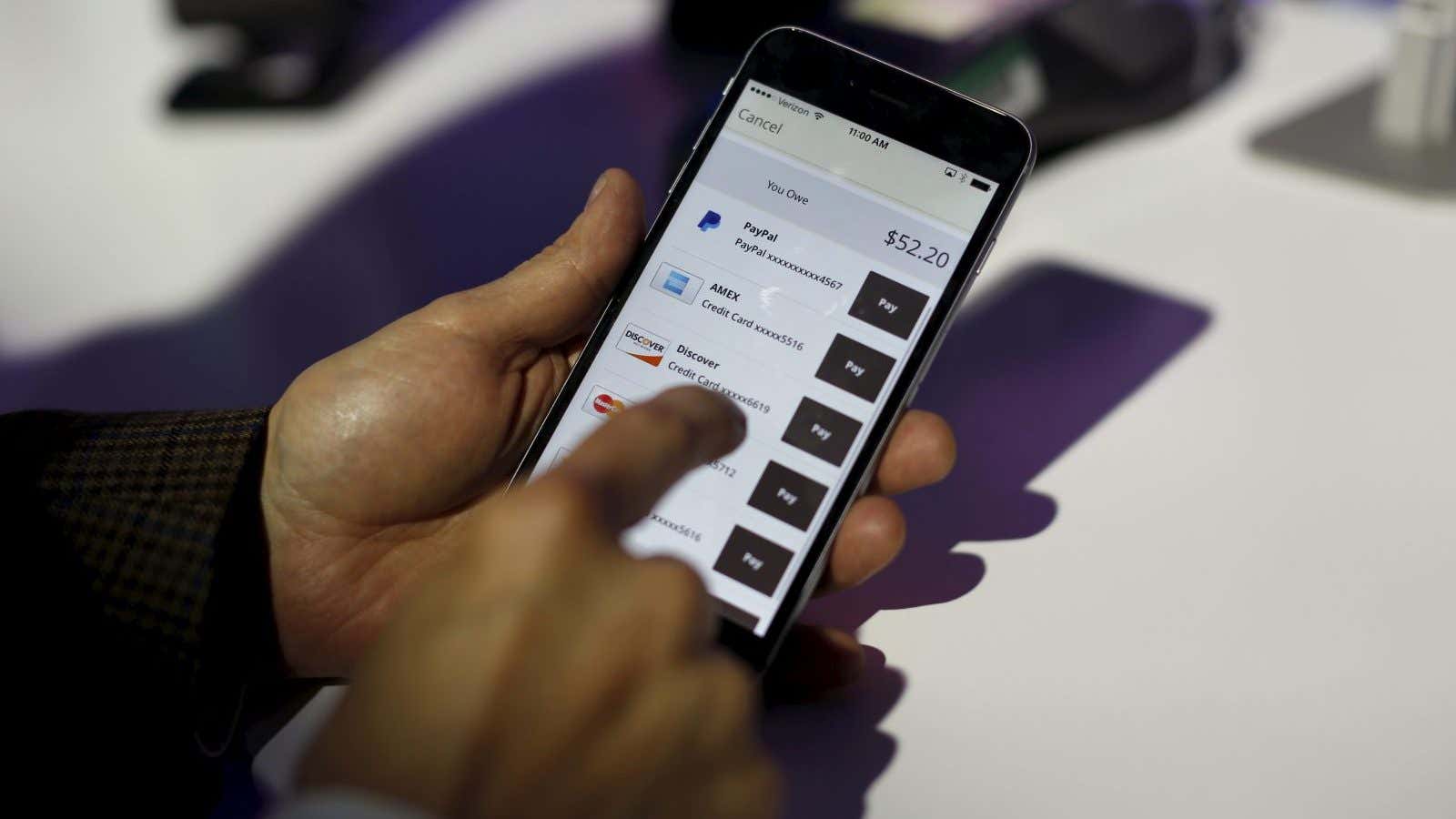American online payments firm PayPal is looking at a bigger payoff from its bets in India.
The company, which set up a startup incubator in Chennai in 2013, has now decided to start taking equity in the firms that join its programme, which was free till now. So far it has churned out 10 companies in four batches.
“We continue to evolve the incubator programme…We want to come to the table and say we are partnering in your success…It is just a natural evolution,” Chandramouliswaran V, PayPal’s site lead in Chennai, told Quartz.
PayPal has two large development centres in Chennai and Bengaluru, employing over 1,500 people. India is an important development hub for the company which mostly focuses on international transactions.
This pivot in PayPal’s incubation model comes at a time when India’s fintech industry is on fire. The government’s demonetisation of two high-value currency notes in 2016 and the rollout of the Goods & Services Tax (GST) earlier this year have given digital payments a boost.
But even before the two events, the industry was predicted to post robust growth. From $33 billion (Rs2.1 lakh crore) in 2016, its total transaction value was estimated to more than double to $73 billion by 2020, according to a June 2016 report (pdf) by consulting firm KPMG and industry body NASSCOM.
“The sector is driven by young first-generation entrepreneurs who are now competing with the largest financial institutions in an extremely tough, cost-conscious Indian market,” the KPMG-NASSCOM report said. “Therefore, in India, the role of incubators, accelerators, and sponsored innovation labs is critical for not just funding, mentorship, and peer connections but also for financial industry exposure and soft skills.”
Inside the incubator
PayPal’s incubation facility is housed at its Chennai office, the largest outside its San Jose headquarters.
PayPal came to Chennai in 2008 when it set up its first software and IT development centre in India. It launched its incubator in 2013, around the time when multiple incubators such as Microsoft’s Accelerator and 91SpringBoard were founded in India.
“At the time of launch (of PayPal’s incubator), the disconnect was apparent and there was a dire need of mentorship, tech infrastructure, network, and global learnings to help take fintech startups to the next level of maturity,” said Sanchit Vir Gogia, chief analyst and CEO of global research and advisory firm Greyhound Knowledge Group.
PayPal gets around 200 applications for each batch and it’s a prerequisite for the candidates to have a ready prototype. Once onboard after a series of interviews spanning several weeks, a startup can cash in on all of PayPal’s areas of expertise, including user experience, privacy, and scaling operations. Being incubated at PayPal gives entrepreneurs easy access to the company’s global leadership team and an opportunity to tap into a wider ecosystem of fintech veterans.
“For us, it (getting selected for the PayPal programme) was huge. It gave us a lot of credibility. The association with PayPal was a clear message that we are trying to do some good things,” said Anand Ramachandran, co-founder and CEO of Fantain Sports, a fan relationships management startup that was part of PayPal’s first group.
“We did a bunch of pivots and they (PayPal’s mentors) were a great sounding board not just for the ideas but testing out the technologies,” added Ramachandran.
There has been some learning for PayPal, too. For one, the programme was sector-agnostic when it first began but now focuses only on fintech. The company has also increased the number of startups it takes in every batch. “What we do today in the incubator is an opportunity for all of us to come in and partner with the ecosystem locally. And wear our innovator’s hat and have conversations,” Chandramouliswaran said.
Now as PayPal takes equity in firms, it will presumably have to offer more to startups than it did so far.
“A few years back, a lot of these accelerators and incubators were experiments for everyone. It was a method for many organisations to just explore what is out there,” Vivek Belgavi, who heads financial services technology for PwC India, told Quartz. “Now we are in the second stage of the journey. People have learned and there’s focus on business use cases, returns on investment, (and) business impact.”
Now the startup incubation business itself has matured and a lot more players give young firms a boost. So each incubator will have to differentiate itself. Earlier, simply being associated with a brand like PayPal and having access to fintech domain knowledge helped. Now, since giving up equity is not easy for any founder, they’re going to be looking for more than just domain expertise, and expect benefits like access to the company’s top customers.
“(One area where) they could perhaps have pushed us more is access to capital,” Ramachandran of Fantain said. “In hindsight, if PayPal can help startups raise their first round, I think that would be huge.”
Update: PayPal has confirmed that it has not applied for a prepaid payment instrument (PPI) license in India although media reports suggested that it had.
